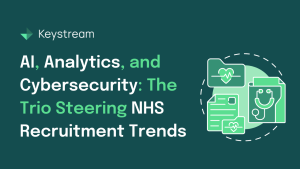21.03.2024
The Government’s Digital Aspirations and its Impact on The National Workforce
The UK government is on a mission to revolutionise public services and position itself as a global leader in digital innovation. With ambitious plans to harness technologies like artificial intelligence (AI) and bridge the digital divide, the government is spearheading efforts to ensure that no one is left behind in the digital age.
However, these ambitions are not without challenges. Despite strides towards modernisation, issues such as service delivery inefficiencies and system malfunctions continue to impede progress. From glitches in the Universal Credit system to disruptions in essential services like court records and education inspections, the path to digital transformation is laden with hurdles.
In response, the government has committed over £1.1 billion to train thousands in future technologies. Spearheaded by the Science and Technology Secretary, these initiatives aim to cultivate a highly skilled workforce in AI, quantum computing, and more, encouraging innovation and driving economic growth.
However, the need for digitally skilled professionals is now. While investments in future talents are pivotal, the immediate demand for skilled individuals to lead digital projects cannot be understated. These individuals will not only propel current initiatives but also play a pivotal role in upskilling others within the projects.
Government plans for AI adoption include investing in research and development, encouraging collaboration between academia and industry, and integrating AI into public services to improve efficiency and effectiveness. Initiatives may include AI-powered decision-making systems, predictive analytics for healthcare, and personalised services for citizens.
The government’s vision extends beyond AI, encompassing advancements in quantum computing, 6G, and data analytics. These investments seek to position the UK as a trailblazer in technological innovation, spurring growth across vital sectors.
As the UK government navigates the complexities of digital transformation, it faces both challenges and opportunities. By investing in future technologies, upskilling the workforce, and addressing the shortcomings of current initiatives, the government aims to create a more efficient, inclusive, and innovative digital landscape for everyone.
At Keystream, we recognise the significance of a skilled workforce in driving the government’s digital ambitions. With our network of talented individuals, we are ready to support and contribute to the UK’s journey towards digital excellence.









